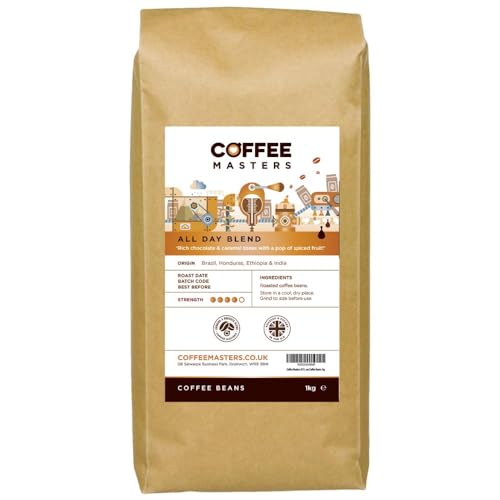10 Tell-Tale Signs You Need To Buy A Types Of Coffee Beans
페이지 정보

본문
Types of Coffee Beans
 Behind every cup of coffee we enjoy there are beans that have been carefully graded. These beans are evaluated in accordance with their size as well as color, shape, and density.
Behind every cup of coffee we enjoy there are beans that have been carefully graded. These beans are evaluated in accordance with their size as well as color, shape, and density.
The AA grade is given to coffee bean beans that meet the above criteria, with the exception that they must not contain more than three defects (quakers). They are typically Kenya AA beans.
Arabica
Arabica coffee beans are also known as Coffea Arabicica and are the most well-known coffee in the world. Legend has it that coffee was first discovered in Ethiopia when a goat herder noticed his herd swaying with more energy after eating the fruits of the coffee plant. This led him to study roasting and brewing the seeds, creating the drink we know and love today.
While a myriad of coffee plants exist however, there are two major species used as the foundation for all our favorite beverages: robusta and arabica. The flavor of the final drink is typically better when you drink the robusta variety.
There are many different arabica cultivars. Each one has its own distinct taste profile. Two of the most well-known varieties are Typica and Bourbon which are the basis for all other arabica varieties were developed either through natural mutation or deliberate crossbreeding. Scott Labs developed the SL28 cultivar in Kenya which is famous for its distinctive chocolaty flavour.
The taste of an arabica variety is based on the environment in which it was grown and also on how it was handled and cooked. For instance, the kind of shade that a tree receives as well as its altitude and soil composition may all play a impact on the final product.
Robusta
Robusta coffee beans, also referred to as coffee canephora, are the second most used kind of coffee beans. They are the beans used for most instant coffees and have twice the amount of caffeine as Arabica unroasted coffee beans Beans. They are also used in a variety of espresso blends, specifically for caffe latte and cappuccino.
Coffea Canephora is a plant that originated from Sub-Saharan Africa. It has been cultivated throughout the world since then. It can be grown at lower elevations and withstand higher temperatures than Arabica coffee plants, which makes it more suited to farmers. Vietnam is currently the largest producer of robusta coffee, followed by Brazil and Indonesia.
The robusta plant is a good quality coffee beans coffee however it's not a favorite among cupping enthusiasts because of its bitter taste and burnt-rubber notes. It is often considered inferior quality coffee and most large coffee companies utilize arabica beans to make their premium products.
The demand for specialty coffees is increasing and small roasters are exploring to capitalize on its outstanding qualities. Our Valhalla Java and Death With Coffee are two examples of exceptional robusta coffees. They are blended with arabica for the perfect balance of flavor and strength. These coffees originate from Uganda in a country where robusta has been cultivated for a long time. You can learn more about them here.
Liberica
Liberica coffee beans are rare and are rarely used in the world. They're less than 2% the world's consumption of coffee beans, and are often overlooked since they don't contain as much caffeine. These beans have a distinct flavor that a lot of coffee drinkers find appealing.
Despite their rarity, Liberica coffee beans are still fairly popular in parts of Asia. They are most popular in Malaysia and Indonesia where there is a significant Muslim community. The coffee industry in these countries has traditionally been very robust and an espresso after prayer is a part the culture.
Liberica coffee's history dates back to 1890s after a worldwide epidemic caused by coffee leaf rust destroyed the arabica crop. This triggered the coffee industry to seek out an alternative species that could thrive in tropical climates, and they soon discovered the Liberica plant.
Liberica plants have a high tolerance for diseases and pests, which made them a perfect replacement for the devastation of the arabica crop. Liberica can also be grown in lower altitudes as well as hot temperatures, which allows it to thrive in Southeast Asia's climate. Liberica beans are the basis for the majority of the coffee in the Philippines and Indonesia.
Excelsa
Although it's not typical for coffee drinkers to come across excelsa beans in their cups, these unique beans are beginning to gain the reputation of having a distinct flavor. According to Komal Sable, a fifth generation coffee farmer with South India Coffee Co. The beans are "a variation of the liberica species with similar teardrop shapes, however, they are smaller." But despite the family resemblance, it's important to note that excelsa is technically not a separate species.
It's not clear how to categorize excelsa beans. This confusion is largely reason for the insufficient their presence in the contemporary 500G Coffee Beans world. Many roasters, farmers, and brewers don't know how to properly cultivate and use these beans.
It's up to each person to decide if they prefer the taste of excelsa and it might take some time to find the right blend. The key is to be open to new ideas and give every kind of coffee a shot until you discover one you truly love. By doing so, you'll be able to discover the wide possibilities that these unique beans can provide. It's a journey that's well worth the trip.
 Behind every cup of coffee we enjoy there are beans that have been carefully graded. These beans are evaluated in accordance with their size as well as color, shape, and density.
Behind every cup of coffee we enjoy there are beans that have been carefully graded. These beans are evaluated in accordance with their size as well as color, shape, and density.The AA grade is given to coffee bean beans that meet the above criteria, with the exception that they must not contain more than three defects (quakers). They are typically Kenya AA beans.
Arabica
Arabica coffee beans are also known as Coffea Arabicica and are the most well-known coffee in the world. Legend has it that coffee was first discovered in Ethiopia when a goat herder noticed his herd swaying with more energy after eating the fruits of the coffee plant. This led him to study roasting and brewing the seeds, creating the drink we know and love today.
While a myriad of coffee plants exist however, there are two major species used as the foundation for all our favorite beverages: robusta and arabica. The flavor of the final drink is typically better when you drink the robusta variety.
There are many different arabica cultivars. Each one has its own distinct taste profile. Two of the most well-known varieties are Typica and Bourbon which are the basis for all other arabica varieties were developed either through natural mutation or deliberate crossbreeding. Scott Labs developed the SL28 cultivar in Kenya which is famous for its distinctive chocolaty flavour.
The taste of an arabica variety is based on the environment in which it was grown and also on how it was handled and cooked. For instance, the kind of shade that a tree receives as well as its altitude and soil composition may all play a impact on the final product.
Robusta
Robusta coffee beans, also referred to as coffee canephora, are the second most used kind of coffee beans. They are the beans used for most instant coffees and have twice the amount of caffeine as Arabica unroasted coffee beans Beans. They are also used in a variety of espresso blends, specifically for caffe latte and cappuccino.
Coffea Canephora is a plant that originated from Sub-Saharan Africa. It has been cultivated throughout the world since then. It can be grown at lower elevations and withstand higher temperatures than Arabica coffee plants, which makes it more suited to farmers. Vietnam is currently the largest producer of robusta coffee, followed by Brazil and Indonesia.
The robusta plant is a good quality coffee beans coffee however it's not a favorite among cupping enthusiasts because of its bitter taste and burnt-rubber notes. It is often considered inferior quality coffee and most large coffee companies utilize arabica beans to make their premium products.
The demand for specialty coffees is increasing and small roasters are exploring to capitalize on its outstanding qualities. Our Valhalla Java and Death With Coffee are two examples of exceptional robusta coffees. They are blended with arabica for the perfect balance of flavor and strength. These coffees originate from Uganda in a country where robusta has been cultivated for a long time. You can learn more about them here.
Liberica
Liberica coffee beans are rare and are rarely used in the world. They're less than 2% the world's consumption of coffee beans, and are often overlooked since they don't contain as much caffeine. These beans have a distinct flavor that a lot of coffee drinkers find appealing.
Despite their rarity, Liberica coffee beans are still fairly popular in parts of Asia. They are most popular in Malaysia and Indonesia where there is a significant Muslim community. The coffee industry in these countries has traditionally been very robust and an espresso after prayer is a part the culture.
Liberica coffee's history dates back to 1890s after a worldwide epidemic caused by coffee leaf rust destroyed the arabica crop. This triggered the coffee industry to seek out an alternative species that could thrive in tropical climates, and they soon discovered the Liberica plant.
Liberica plants have a high tolerance for diseases and pests, which made them a perfect replacement for the devastation of the arabica crop. Liberica can also be grown in lower altitudes as well as hot temperatures, which allows it to thrive in Southeast Asia's climate. Liberica beans are the basis for the majority of the coffee in the Philippines and Indonesia.
Excelsa
Although it's not typical for coffee drinkers to come across excelsa beans in their cups, these unique beans are beginning to gain the reputation of having a distinct flavor. According to Komal Sable, a fifth generation coffee farmer with South India Coffee Co. The beans are "a variation of the liberica species with similar teardrop shapes, however, they are smaller." But despite the family resemblance, it's important to note that excelsa is technically not a separate species.
It's not clear how to categorize excelsa beans. This confusion is largely reason for the insufficient their presence in the contemporary 500G Coffee Beans world. Many roasters, farmers, and brewers don't know how to properly cultivate and use these beans.
It's up to each person to decide if they prefer the taste of excelsa and it might take some time to find the right blend. The key is to be open to new ideas and give every kind of coffee a shot until you discover one you truly love. By doing so, you'll be able to discover the wide possibilities that these unique beans can provide. It's a journey that's well worth the trip.

- 이전글20 Up-Andcomers To Watch The Kids Beds Bunk Industry 24.12.18
- 다음글7 Simple Tips For Rolling With Your ADHD Test Adults 24.12.18
댓글목록
등록된 댓글이 없습니다.


